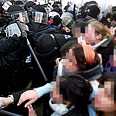
Amona settlers clash with police
Photo: Amit Shabi
I'm not a religious man, but as a Zionist I am very worried about the crisis facing religious Zionism.
As human begins we must be sensitive to their despair; as Israelis and as Jews we must be concerned about a community whose sons and daughters, more than in any other community, volunteer on behalf of the whole society – in combat units, development towns, settling the land and absorbing immigrants.
Realistic Zionists, who reject both Peace Now and Messiah Now, must be very concerned about losing religious Zionism to the closed-off, non-Zionist ultra-Orthodox world.
Clash of values
Ideologically, religious Zionism has happened upon a tremendous clash of values: faithfulness to the State and the belief that it is the "first flowering of the redemption" on one hand, and religious and nationalist faithfulness to the Land of Israel on the other.
Amona Aftermath
Shai Binyamini
When rabbis send their flock to hit and be hit, it's time for a change
This sort of clash of values in a democracy is no simple matter. In enlightened democracies there are certain principles that stand above majority decision.
That is why we must refuse to execute clearly illegal commands. That is why a left-wing activist said h would refuse to execute the decision of the elected government to transfer Arabs.
What's worth dying for?
We have been educated, and have educated our children, to believe that the values of freedom and independence are worth killing and dying for.
But we have demanded religious Zionists accept the principle that, while there are certain values that are more important than "majority rules" and even more important than life itself, faithfulness to the Land of Israel is not one of them.
After forcing our values on them – including the notion that "majority rules" is more important than the sanctity of the entire Land of Israel – we expected them to sanctify democracy.
From break to crack
Here, our behavior has stood to turn the deep crack into an outright break.
Democracy requires more than holding elections, and it is more than "majority rules." Democracy is a value system, respect for personal rights and consideration of minorities.
Minority rights
What protects minorities in a democracy? First of all, the rules of the game.
But when the settlers won the Likud referendum on disengagement, were the results honored?
Sometimes protecting minority rights on matters of principle requires special procedures – but did we do this by rejecting their demand for a referendum?
When enforcing a painful decision on a minority we can at least expect compassion on the part of the government – but can the Gush Katif evictees, still scattered in "temporary solutions" - have they felt such compassion since the army's hugs during the pullout turned to a bureaucratic war of attrition?
From Katif to Amona
And what about the media – did journalists manage to overcome their political beliefs to protect a minority from governmental manipulation?
The last defense of minorities in a democracy are the legal authorities. But did the Supreme Court's reversal of a restraining order that would have made it possible for this minority to clear out of Amona peacefully and honorably – did this contribute to the feeling of that minority that the courts will protect their rights?
What did cracking the skulls of non-violent protesters (no, not everyone at Amona was violent) contribute to the right to protest that is absolutely essential to any democratic society?
Since then, every effort has been made – and rightly so – to arrest every violent protester. But not one policeman has been arrested. Does that strengthen the feelings of justice and equality before the law?
And so we have trampled the values of the religious Zionist community, we have left them alone in their pain and suffering, and now they feel they have become a scapegoat that can be beaten at will.
Apparently, the deep crack caused by disengagement was inevitable. But the break can still be prevented, and the leadership must do all it can to prevent it.
We must employ unlimited determination in the face of any and all outbursts of violence. And unlimited sensitivity and respect for brothers.
Sallai Meridor was the chairman of the Jewish Agency from 1995 – 2000















